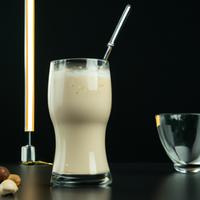
1 serving (240 grams) contains 200 calories, 30.0 grams of protein, 3.0 grams of fat, and 9.0 grams of carbohydrates.

Log this food in SnapCalorie

Nutrition Information
Calories |
200.0 | ||
|---|---|---|---|
% Daily Value* |
|||
| Total Fat | 3 g | 3% | |
| Saturated Fat | 1.0 g | 5% | |
| Polyunsaturated Fat | 0 g | ||
| Cholesterol | 10.0 mg | 3% | |
| Sodium | 150 mg | 6% | |
| Total Carbohydrates | 9 g | 3% | |
| Dietary Fiber | 1.0 g | 3% | |
| Sugars | 5.0 g | ||
| protein | 30 g | 60% | |
| Vitamin D | 100.0 mcg | 500% | |
| Calcium | 200.0 mg | 15% | |
| Iron | 1.0 mg | 5% | |
| Potassium | 300 mg | 6% | |
* Percent Daily Values are based on a 2,000 calorie diet. Your daily values may be higher or lower depending on your calorie needs.
Food Attributes
Source of Calories
About Proteine shake
Protein shakes are a convenient and versatile beverage made by blending protein powder—commonly derived from sources like whey, casein, soy, or pea—with liquid bases such as water, milk, or plant-based alternatives. Originating from the fitness and wellness culture, these shakes are often accompanied by additional ingredients like fruits, nuts, or seeds to enhance flavor and nutritional value. They're celebrated for their high protein content, which supports muscle repair, growth, and overall satiety, making them a popular choice among athletes, gym-goers, and busy individuals. While low in calories and fat, the nutritional profile varies depending on added sugars or artificial flavors, so ingredient labels should be checked carefully. Typically neutral in cuisine affiliation, protein shakes fit into diverse dietary preferences and can be customized to suit vegan, gluten-free, or low-carb lifestyles.



